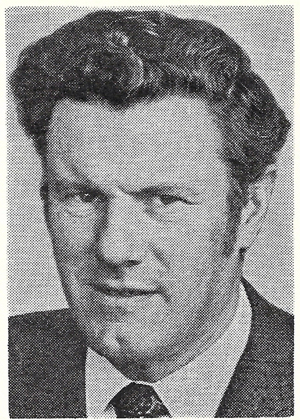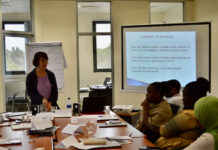
Introduction
Chapter 5 from the book ‘A journalist’s guide to the use of English’
A GOOD VOCABULARY IS ESSENTIAL FOR THE journalist, because, as we have stressed, words are the raw materials of communication. But word power alone is not enough; we also need to master syntax, the craft of construction, before we can be effective writers.
If the construction is faulty, the communications bridge is weakened. It follows, therefore, that we must know not only the meaning of words but also their function in a particular context. Confusing the function leads to error in sentence construction and a consequent loss, or ambiguity, of meaning.
It is for this reason that we have stated that a knowledge of syntax is the foundation of a good style. We have also stated that the good reporter is the person who is in the right place at the right time and who has the right word ready. We have examined what constitutes the right word. We shall now consider how to put the right word in the right place.
It is assumed that every journalist should have a basic knowledge of English grammar, but this assumption is becoming more suspect each year. Grammar is no longer regarded as a vital ingredient of secondary education. There may be good ground for the educationists to state that grammar, as such, is no longer essential for everyday life. But where everyday life involves written communication, as it does for the journalist, then the premise is faulty.
It is no part of our purpose, however, to write a complete introduction to English grammar.
All that we can do in this comparatively brief consideration is to examine those areas where errors are frequently made; to give examples of these pitfalls and to state the rules for avoiding them. Some of the rules stated may seem very basic but all refer to errors that occur frequently. Indeed, this study has been prepared to answer a need exposed by analysis of common faults.
Sentence construction 1
A SENTENCE is a group of words expressing a complete thought.
Definition: A sentence must have a verb and a subject, either stated or understood.
Rule: The verb is the most important part of the sentence, for it is this which gives the sentence its meaning (verb is derived from the Latin word verbum which means word). The verb expresses action or a state of being. which is related to the subject.
Sentences come in four types:
E.g. The News Editor has been promoted – statement (called the indicative by the grammarian).
E.g. Promoted, you say! – exclamation.
E.g. Why hasn’t the Deputy Editor been promoted? – question.
E.g. Give the Deputy Editor the job – command (traditionally called the imperative).
The subject is easy to find in the statement – the News Editor has been promoted
In the exclamation or question one has to invert the sentence to find the subject (i.e. convert each into a statement):
– you say promoted.
– the Deputy Editor hasn’t been promoted, why not?
In the command the subject is understood:
– you give the Deputy Editor the job.
Pitfall:
The most common error (often, unhappily, a deliberate one is to write a “sentence” that is incomplete, by leaving out either subject or verb.
E.g. The story may read: “The new cruise liner sailed majestically down the river. She has been built with all the care that skilled craftsmen could give her. And the stamp of their reputation.”
What about the stamp of their reputation? What is it doing? Remember, a sentence must have a verb.
E.g. Less objectionable is the omission of the subject. “The old man lay down. And died” In this example he is understood. The words and died could have been added to the first sentence. They are disjoined to give emphasis to the finality of it all.
However, this technique should be used very sparingly and in the right place. However, beware of the chatty columnist’s “ Met a man last week” type of construction.
Objects
ALL SENTENCES should have a subject (either expressed or understood) and a verb, but not all sentences have an object. Indeed some verbs cannot have an object.
Definition: The object is the person or thing which receives the action of the verb.
E.g. The journalist (subject), writes (verb), headlines (object).
Writes is thus a transitive verb for the action has crossed over to the object. But if nothing receives the action of the verb, the verb is intransitive.
E.g. The journalist (subject) smiles (verb)
This is a complete statement unless one adds the word rarely and that is an adverb telling us how often the journalist smiles. It is not an object.
Again transitive verbs can be used intransitively where no object is given.
E.g. The reporter (subject) writes (verb)
Objects may be either direct or indirect.
E.g. The reporter (subject) sent (verb) the story (object) to the Editor (indirect object)
The main (direct) object is the story for this received the action.
The secondary (indirect) object is the Editor who received, not the action, but the object itself.
The concept of ‘case’
SUBJECTS, objects and indirect objects are the roles in which parts of speech may occur. However, the grammarian does not call them “roles”. They are called cases.
The subject is in the nominative case.
The direct object is in the accusative case.
The indirect object is in the dative case.
However, as there is no distinction in form between the accusative and dative, we may use English terms and think simply of the subjective case and the objective case.
The complement
ONLY those verbs which express an action (active verbs) take an object. Inactive verbs express a state of being (or existing and take a complement, for each half of the sentence complements the other.
Inactive verbs may be described as linking verbs for they link two balancing halves of a sentence. The most common of these is the verb to be in its various forms – am, is, are; was, were, etc. But there are others such as seem, appear, become, and verbs like taste, smell, feel, look, but only when the verb is inactive.
E.g. He (subject) feels (verb) ill (complement) BUT He (subject) feels (verb) the cloth (object)
Summary
A sentence must have a verb and a subject (stated or understood). Active verbs take an object; inactive verbs take a complement. Both the subject and the complement are in the subjective case; objects (either direct or indirect) may be described as being in the objective case.
It is also necessary to know that prepositions (with, by, on, etc.) are followed by nouns or pronouns in the objective case. The importance of this will be seen when we consider pitfalls affecting the use of pronouns and prepositions.
Sentence construction 2
THERE is one other very common pitfall area in sentence construction and that concerns the agreement of the subject and the verb.
The verb must agree with the subject in person and number.
E.g. (Person): I give BUT He gives.
E.g. (Number): Spelling is important, – BUT – Spelling and Syntax are important.
Agreement in person is an easy matter, for the verb changes only in the third person singular.
Agreement in number, however, has several complications, al! involving possible pitfalls. So several more rules must be stated.
Rules:
1. Double subjects require a plural verb form, but words joined to a single subject by a preposition do not affect the verb.
E.g. Spelling and syntax are important – BUT – Spelling, with syntax, is important.
2. If two subjects are linked by either-or or neither-nor the verb agrees with the subject nearer it.
E.g. Neither the News Editor, nor any of the reporters, have received the call.
3. If one subject is affirmative and the other negative the verb agrees with the affirmative.
E.g. The Editor, not the reporters, was having lunch.
4. Nouns, plural in form but singular in meaning, take a singular verb.
E.g. Mumps is unpleasant.
5. Plural subjects describing a unit of measurement are treated as singular.
E.g. Thirty folios is a lot of copy.
6. The word number is treated as singular when it refers to a mathematical figure, but as plural when it means a few.
E.g. A number is printed on each keyboard – BUT – A number of keyboards are required.
7. Singular pronouns and adjectives (e.g. each, one, everyone, another) take a singular verb form, BUT None can be either singular or plural.
E.g. Have you any bananas? No, there are none – BUT – Have you any beer? No, there is none.
Here and there cannot be subjects of sentences. They are adverbs.
E.g. Here are your tickets (subject – tickets).
There is your ticket (subject – ticket).
Note: These sentences are inverted.
Parts of speech
AS SOON as we discuss parts of a sentence (e.g. subject, object, complement) we become involved with parts of speech. There are eight of these: noun, adjective, pronoun, verb, adverb, preposition, conjunction, interjection (or exclamation). We can forget about the interjection; it should never appear except in a title (e.g. “Oh! Calcutta!”).
However, the seven others all produce problems which we shall look at in turn, before considering further pitfalls in sentence construction.
Verbs 1
IN DISCUSSING sentence construction, we have stressed that the verb is the most important part of the sentence. Verbs are the words which provide the motive power for the sentence.
The engine can run at tick-over speed, in which case the verb is simply expressing a state of existence (i.e. I smile). Or the engine can give directions to the sentence. These verbs are transitive verbs and take an object.
We have seen that verbs can be transitive or intransitive and we have also seen that transitive verbs can be used intransitively.
E.g. I paint pictures (transitive). I paint (intransitive).
In addition, we have said that verbs can be linking verbs (e.g. the verb to be) in which case they take a complement.
It is also necessary to recognise three other attributes of the verb-voice, tense and mood.
Voice:
Verbs can be used actively or passively. This is called their voice.
Generally speaking the active voice makes for more effective prose and certainly should be used in headline writing, although there are exceptions to this rule (E.g. Kennedy shot).
Be on your guard against the double passive (E.g. the point is sought to be evaded) and such monstrosities.
Tense:
There are three basic times (present, past and future) and three basic actions (simple, completed and continuing) and these give nine different tenses as the following table shows:
Simple
Present: I see
Past: I saw
Future: I shall see
Continuing
Present: I am seeing
Past: I was seeing
Future: I shall be seeing
Completed
Present: I have seen
Past: I had seen
Future: I shall have seen
Traditionally the continuing tense is called the imperfect and the completed is called the past perfect, but the names are unimportant.
Three other tenses can be formed where there is a mixture of continuing and completed action:
Present: I have been seeing.
Past: I had been seeing
Future: I shall have been seeing.
Pitfalls:
There are two main pitfalls, which occur in the use of tenses:
1. Mixing past and present tenses in narrative reporting. (The present tense is often used for impact, as in captions.)
E.g. Armstrong steps on to the moon.
When this form is used it must be used consistently. One cannot then say:
He hesitated with one foot on the ladder.
2. The second main source of trouble is the failure to place tenses in their chronological order, particularly when using reported speech.
E.g. The speaker may say: “I am in favour of nuclear disarmament because I have witnessed the effects of radiation.”
In reported speech the present simple and present completed tenses must become past simple and past completed: He was in favour …. because he had witnessed.
Mood:
Verbs can be used in several different ways. These are called moods. The three main forms are:
1. Indicative – statement, question or answer.
2. Imperative – command.
3. Subjunctive – supposition.
The verb forms in the tables of tenses on the previous page (to change to mentioned earlier) were all in the indicative mood.
The imperative mood produces just two forms – “see” and “be seen”.
E.g. (You) See the cashier about your wages. (You) Stand up and be seen.
However, it is the subjunctive mood which produces the pitfalls.
Rules:
1. The verb-forms for the subjunctive mood are the same for all verbs (except to be) apart from a small change in the third person singular, present tense.
E.g. “She has faith” becomes “If she have faith.”
“He finds” becomes “Should he find.”
2. With the verb to be the following alterations occur:
| Present | Past | |||||
| Indicative | Subjunctive | Indicative | Subjunctive | |||
| I am | (if) I be | I was | (if) I were | |||
| We are | (if) we be | We were | (if) we were | |||
| You are | (if) you be | You were | (if) you were | |||
| He is | (if) he be | He was | (if) he were | |||
| They are | (if) they be | They were | (if) they were | |||
| ALL ARE DIFFERENT | 1ST & 3RD PERSON SINGULAR ARE DIFFERENT | |||||
Pitfalls:
The confusion in recognising the subjunctive occurs in three ways:
1. The use of the verb be is not always a subjunctive. It is often a corruption of should be. (Simple future tense.) E.g. I move that the matter be discussed (should be).
2. Where the past subjunctive is not really past at all; but has to do with supposing not with pastness.
E.g. If that were my headline I would re-write it. (Subjunctive.) If that was your headline yesterday you perpetrated a libel. (Indicative, simple past tense.)
N.B.: Use were for the supposed, untrue or impossible situation. E.g. If 1 were you. If I were king.
3. The subjunctive need not be prefaced by if. It may be prefaced by such words as:
Imagine you were king.
As though you were on the board.
Just suppose you were the Editor.
Nouns
HALF the words in your dictionary are common nouns. They are the names given by man to places, things, emotions and states. Uncommon or proper nouns are the names given to persons or special places or things (e.g. George, London, Tuesday).
Common nouns are called abstract nouns when they refer to abstract things such as qualities (beauty, honesty), emotions (anger, pity), states (friendship, childhood) and processes (day-dreaming, bird-watching).
Collective nouns is the term given to collections of things/people (e.g. forest, crew, flock).
The most common pitfalls in use of nouns concern plurals, possessives, collectives and gerunds – which are not, in fact, nouns at all.
Possessives: These are discussed in notes on the Apostrophe in the section on Punctuation.
Collectives: Generally, a collective should be treated as singular, but if the result sounds silly make it into a plural and make sure the verb agrees.
E.g. The Cabinet is determined. – Correct for Cabinet is a single body.
The Cabinet is discussing. – Incorrect. A single entity cannot discuss.
The Cabinet is divided. – Correct. It must be unified (i.e. one) before it can be divided.
The Cabinet are agreed. – Correct. It takes more than one to agree (c.f. Discussing).
Rule: If both a single and a plural application occur in the same sentence, choose the most suitable and stick to it. Don’t be pedantic; do be consistent.
Exception: Sport – a team is always treated as plural E.g. Chelsea were defeated.
Gerunds
Definition: GERUNDS are verbs in participle form used as nouns.
Pitfalls: Participles act as adjectives; gerunds act as nouns.
E.g. A running man (participle, adjective). Running is his hobby (gerund, noun).
N.B. Because gerunds are equivalent to nouns, they require a possessive case in certain instances.
E.g. I saw her running (objective because running is a participle describing her). She was keen on her running (possessive, because running is a gerund).
Adjectives
Definition: ADJECTIVES are used to describe or limit the meaning of a noun, pronoun or other adjective by indicating which, how many or what kind.
The most common adjectives are: the definite article (the) and the indefinite article (a, an).
Demonstrative adjectives identify the noun or pronoun (this, that, these, those). If these words are used without a noun they become pronouns (e.g. Those were the days).
Possessive adjectives show ownership (my, your, our, etc.), NOT to be confused with mine, yours, ours which are pronouns.
N.B.: In English adjectives do not change their ending in order to agree with the noun as to number or gender. Nor do we make them agree when we use nouns as adjectives. E.g. Trade unions NOT Trades unions.
Adjectives of number: The main problems, however, occur in the use of adjectives of number, adjectives of degree and absolute adjectives.
Rule: Fewer refers to number, less to degree or quantity.
E.g. Fewer strawberries in the fields results in less fruit in the shops.
Adjectives of degree: These adjectives are used to compare one noun with another. E.g. The curry is hot (hot is an adjective joined by a linking verb is to the noun curry).
In this sentence the adjective hot is a positive statement, but there are degrees of heat.
Definition: The degrees of comparison are positive, comparative and superlative.
E.g. The curry is hot (positive). The curry is hotter (comparative). The curry is hottest (superlative).
Pitfalls: The superlative is used only where three or more things are compared.
E.g. He is the younger of the two brothers. (Comparative degree because only two brothers are compared.)
She is the eldest of the three sisters. (Superlative degree because three sisters are compared)
N.B. Elder, eldest are used where there is a family relationship; otherwise older and oldest are used.
E.g. He is the oldest of the club members.
Pitfall: The form to be used in adjectives of degree also causes confusion.
Rules:
1. Where there is one syllable in the adjective add ER, EST. E.g. cold, colder, coldest.
2. Where there are three syllables, use the words more, most (less, least). E.g. Curious, more curious, most curious.
3. Where the adjective has two syllables follow idiomatic usage. E.g. Ugly, uglier, ugliest – BUT – hopeful, more hopeful, most hopeful.
Absolute adjectives: Some adjectives cannot be compared because the quality of the adjective is absolute.
E.g. A thing is either perfect or less than perfect. It cannot be more or most perfect. It is equally ludicrous to write more fatal.
The following are further examples of absolute adjectives:
Absolute,
Basic,
Complete,
Empty,
Essential,
Final,
Full,
Ideal,
Impossible,
Obvious,
Pure,
Unique,
Ultimate
Colours: Colours are also absolute when used as adjectives denoting quality. You should not write less red or more blue when you mean lighter red or deeper blue. However, more can be linked with a colour when referring to quantity.
E.g. I have more red paint than blue (quantity not quality).
Names and titles
WE may have been taught that names are nouns, but this is only partly true.
The Christian name is the noun (e.g. John). But the surname is adjectival in function for it describes which John. E.g. John Smith – John, the smith. John Robinson – John, the son of Robin. John Bottomley – John, who lives at the bottom of the meadow.
Pitfall: One should not write: Rev. Smith, for this is using an adjective to describe an adjective without any noun being present.
One must say
The (definite article) Rev. (adjective) John (noun) Smith (adjective)
The same applies to knights:
Sir (adjective) John (noun) Smith (adjective)
However, one cannot apply the same logic where Lord and Lady are used, because the use or omission of the Christian name denotes a different rank.
Indefinite article: The simplest adjective is the indefinite article a or an.
Rule: Use an where the noun begins with a vowel or silent h.
E.g. an hour, an honourable intention NOT an hotel because it is now acceptable to sound the H.
Definite article: Do not write: Death occurred yesterday. Write: The death occurred yesterday.
Prepositions
THERE are two “rules” about the use of prepositions: one should be remembered; the other ignored, for it is not a rule at all.
Rule: Prepositions take an object. (The importance of this will be seen when we consider pitfalls in the use of pronouns.)
Non-rule: “Never use a preposition to end a sentence with.”
This sentence, of course, breaks its own rule and in so doing makes its point; prepositions at the end of a sentence can make a sentence very ugly. However, contriving to avoid using a preposition at the end of a sentence can be just as clumsy.
E.g. Consider the Churchillian: “ This is something up with which I shall not put”.
The answer is to use some common sense, remembering the criteria that language should be easy to understand and should sound well. If your sentence does not meet those criteria, re-cast it. If the use of a preposition at the end of a sentence is unavoidable, it does not matter provided that the sentence reads easily. In any case, you will be in good company, for all the great English stylists have broken this so-called rule.
Idiomatic usage: The most common error in handling prepositions is to use the wrong one. This is not so much a matter of rule as of idiomatic usage.
The following is a list for your guidance:
abhorrence of
absolve from
accord with
acquiesce in (not to)
adapt to (purpose)
adapted for (by nature)
affinity between (not to)
agree on (a point)
agree to (a proposal)
agree with (a person or opinion)
aggravated by
alien from (not to)
amenable to
arise from (not out of)
averse to
bestow upon
(the mind) boggles at (not with)
change for (a thing)
change with (a person)
chary of
compare with (not to)
compatible with
confer on (but bestow upon)
conform to (but in conformity with)
connive at
consider (no preposition; do not use as)
convenient for (purpose)
convenient to (person)
comprise (no preposition; do not use of)
correspond with (person)
correspond to (thing)
consequent upon
deficient in
die of (not from)
derogatory (to)
different from (not to; nor than which is a conjunction)
differ from (things or persons, in a comparative sense)
differ with (a person when disagreeing)
dissent from (not to)
distaste for
equal to
exception to
glad at (a piece of news)
glad of (a possession)
guiltless of
impatient for (things)
impatient with (persons)
inculcate upon someone (not inculcate someone with)
independent of (not from)
indicative of
ineligible for
inflict upon
infuse into (not with)
inspired by
instil into
irrespective of
martyr for (a cause)
martyr to (a disease)
oblivious of
part from (persons)
part with (things)
prefer to
prevail against (things)
prevail on (persons)
profuse in
pursuant to
reconcile to (thing)
reconcile with (person)
satisfied with
similar to
taste of (food)
taste for (arts)
thirst for or after (knowledge)
unconscious of
N.B.: Avoid compound prepositions. E.g. in connection with, in regard to
Some are worse than others; the worst constitute some of the greatest abominations in English usage.
Pronouns
MOST of the pitfalls in the use of personal pronouns arise from a failure to recognise in which case the pronoun is, although the problem is rarely seen or defined as such. Briefly, what is in doubt is the ending of the pronoun.
This difficulty arises because it is unfashionable to talk about case in relation to the English Language. But an understanding of case answers the difficulty.
Rule:
1. If a first person pronoun is the subject or complement of a sentence, it is in the subjective (nominative) case and the form I.
2. If a first person pronoun is the direct object, it is in the objective (accusative) case and the form is Me.
3. If a first person pronoun is the indirect object, it is in the objective (dative, this time) case and the form is Me.
You and me: More often than not you and me is correct. But how do you recognise when it is right?
First of all, forget the you. This does not change its form and so it is no help; it only gets in the way of your thinking. Simply think about the I and me.
E.g. (You and) I are going for a walk. I = subject = subjective (nominative) case.
Will the ball hit (you or) me? Me = object = objective (accusative) case.
Will he give the ball to (you or) me? Me = Indirect object = objective (dative) case.
On the other hand modern usage has over-ruled the pedantic form:
It is I, I am he.
Because the verb to be takes a complement I and He are in the subjective (nominative) case, but everyone says “It’s me”. However, these forms are primarily used in speech not in writing.
Another source of confusion is found where two pronouns are linked. A common error is to construct a sentence like this:
The Editor gave he and I the afternoon off.
Consider these statements singly:
The Editor gave him the afternoon off. The Editor gave me the afternoon off.
Hence, the Editor gave him and me the afternoon off.
Pitfall:
Should we say between you and me or between you and I.
The answer is that between is a preposition and all prepositions (e.g. with, by, in, from) take an object. So this needs the objective (accusative) case and it must be between you and me. If in doubt, try another preposition. Would you say with I? No, it must be with me.
Who and whom: Now let us look at the pitfall that arises over the use of who and whom. Again the same rules apply.
E.g. Who will come with me? Who = he = subject = nominative case.
Whom did he kick? Whom = him = object = accusative case.
By whom was he kicked? Whom = him = of preposition by = accusative case
To whom shall I give it? Whom = him = Indirect object = dative case.
The simplest test is to substitute he for him. If he is right, it should be who. If him is right, it should be whom.
Conjunctions
A FREQUENT source of error is to confuse conjunctions with prepositions, particularly in such constructions as:
He is as tall as me. She is older than me.
Both these are incorrect. The correct form is :
He is as tall as I (am). She is older than I (am).
Verbs 2
Compound verbs: Verbs may be simple (I saw) or compound (I was seeing).
Compound verbs comprise auxiliary words (was, would be, might, etc.) and participles (seen, seeing).
Pitfalls:
1. to be afraid of splitting them.
E.g. “You must occasionally use conjunctions to link one idea with another.”
This is idiomatic and more precise than the form: “You must use conjunctions occasionally.”
2. On the other hand, avoid splitting compound verbs by whole phrases or clauses. This makes reading and understanding difficult.
E.g. “You must, if you are to write effective sentences which can be readily understood by the reader, whatever his intelligence, use conjunctions.”
Shall and will: The rule is quite complex but the following is a rough and ready guide:
Shall is used with the first person verb form (singular and plural) and will with the second and third person (singular and plural) verb forms.
E.g. I shall, We shall – BUT – He will, You will, They will
These forms should be inverted only when extra emphasis is required.
1. You shall succeed. 2. I will succeed.
Non-finite verbs:
Verbs can be finite.
E.g. I walk; I am walking
or non-finite (participles used as adjectives; gerunds and infinitives).
Gerunds and infinitives: We have seen how easily the gerund can be confused with the adjectival participle, but the gerund can also be confused with the infinitive.
E.g. We can write:
I am able to meet him.
I am competent to perform the operation.
It is sufficient to perform one task.
It is adequate to assume.
Each of these italicised words is followed by an infinitive but similar words require a gerund.
We can write:
“Sufficient to perform (infinitive) – BUT – We must write: “equal to performing (gerund).
This is largely a question of idiomatic use but it is possible to give a few examples of where a gerund may be needed:
E.g. after a noun or pronoun:
“with a view to his performing” (notice the possessive)
after an adjective:
“equal to performing” (note: to is a preposition; it is not part of the verb)
after a verb:
“The Chancellor is able to introduce a new tax” (infinitive) – BUT – “The Chancellor is committed to introducing a new tax” (gerund)
Pitfalls:
1. Failing to use the infinitive. E.g. Try to get – NOT – Try and get.
2. The infinitive is not always prefaced by to.
E.g. I taught him to cook.
I saw him write.
I wanted him to sing.
I heard him shout.
I asked him to depart.
I watched him go.
All are infinitives. There is no logical reason for this but certain verbs (e.g. see, hear, need, know, observe, let, watch, feel, etc.) do not require to in the infinitive form.
Split infinitive: There are occasions when the split infinitive can be the lesser of two evils. And the alternative evils are ambiguity and artificiality. Let us consider these separately.
1. Ambiguity:
Which of these is the lesser evil?
The object is to further cement trade relations (split infinitive)
OR
The object is further to cement trade relations. (In the latter we don’t know if a further object or further cementing is implied.)
2. Artificiality, where the artificial avoidance of a split infinitive upsets the rhythm of the sentence.
Which of these do you prefer?
(a) “The modifications are intended to better equip candidates.”
(b) “The modifications are intended to equip better candidates.”
(c) “The modifications are intended better to equip candidates.”
(a) is the split infinitive
(b) better has now become an adjective, we have now got superior candidates
(c) is obviously contrived and artificial.
So choose (a). It is the simplest, the sanest and it sounds most pleasant.
Adverbs
Definition: JUST as adjectives describe (or limit) nouns and pronouns, adverbs describe (or limit) verbs, adjectives and other adverbs.
Pitfalls: There are several pitfalls that can arise if they are positioned incorrectly.
1. To make them into adjectives, as in the example quoted above: “the modifications are intended to equip better candidates”.
2. To make the adverb qualify the wrong verb.
E.g. Correct: You must occasionally use conjunctions to link one idea with another.
E.g. Incorrect: You must use conjunctions occasionally to link one idea with another.
(Here occasionally qualifies to link instead of must use. Hence we have occasionally linking instead of occasionally using.)
Often the best guide is to follow the idiomatic form where the meaning, by common usage, is clear.
3. Complements can be separated from the verb, but try to avoid a sentence where the adverb separates the object from its verb.
E.g. Incorrect: They have interpreted rightly the situation. Correct: They have interpreted the situation rightly.
N.B. Beware of irrelevant adverbs. Consider the cliche leave severely alone where severely has no meaning. You cannot be severe in this negative way.
Sentence construction 3
MOST of the pitfalls in sentence construction stem from a disorderly mind, for they are breaches of good order. Even simple sentences can make nonsense.
E.g. For the second time in a week a woman was drowned in her bath at Blanktown.
A sentence can also be silly because it is too orderly:
E.g. Injured fighting a fire at a Downtown fish shop last night Downtown fireman George Shaw, of Upper Street, Downtown, was treated at the Downtown General Hospital.
Quite clearly this did not happen in Blanktown but does one need all this repetition?
The main sources of error, however, occur in four main areas:
1. The non-sequitur (double sentences where the second statement has no logical relationship with the first half; hence, it does not follow sensibly).
2. The incorrect positioning of a phrase.
3. The incorrect positioning of a clause.
4. The misrelated or unrelated participle.
Let us have a look at them.
The non-sequitur:
E.g. A new pension scheme will be introduced next year and it is expected that by the year 2000 there will be twice as many octogenarian pensioners as there were in 1970.
This implies, quite wrongly. that the new pension scheme will lead to greater longevity. The ideas are unrelated and should be expressed as separate statements.
Misplaced phrase: E.g. Betty Blott was charged with stealing a purse at Downtown Magistrates’ Court today.
Misplaced clause: E.g. After his car had crashed at Blanktown a fireman had to be called to release the driver.
Whose car? The fireman’s?
Misrelated participle: E.g. Walking across the road, the car ran over him. (Walking across the road is a phrase which is intended to describe him; positioned as it is, it describes the subject – i.e. the car.)
The sentence should read: Walking across the road, he was run over by the car.
Rule: Participles used in this way are adjectives. Hence, participial phrases are adjectival in function and must be related to the correct noun or pronoun. They must not be left dangling. Consider the following:
1. Participial phrase (correct) – Having rested, the troops marched on.
2. Dangling or misrelated participle (incorrect) – Having rested, the march continued.
3. Absolute phrase (correct) – The troops having rested, the march continued.
Defining phrases and clauses
Another common pitfall is the wrong use of commas in defining phrases and clauses (see also Punctuation).
Consider the difference in meaning between these two sentences:
1. The reporters aware of the deadline worked fast.
2. The reporters, aware of the deadline, worked fast.
The first example means that only those reporters aware of the deadline worked fast. The second means that all the reporters were aware of the deadline and all worked fast.
In the first instance the phrase aware of the deadlines defines, limits and restricts.
In the second instance, the same phrase describes or comments in a non-restrictive way.
The same distinctions occur where clauses are used:
1. The reporters who were aware of the deadline worked fast and
2. The reporters, who were aware of the deadline, worked fast.
Rule:
If the phrase or clause defines, omit the commas. If the phrase simply extends the information by giving additional descriptions, include the commas. (The distinction is that commas enclose a phrase or clause which can be left out without changing the meaning.)
That and which: We have come to regard these two words as interchangeable, although grammatically they are not.
Rules:
1. That should be used with the defining clause (i.e. where the commas are omitted).
E.g. The house that Jack built.
2. Which should be used where the clause is non-defining (i.e. where the commas are used).
E.g. In the island of South Uist, which I have just visited, there is not one single tree.
N.B. – That can also replace who in a defining clause.
E.g. The reporters that were aware of the deadline worked fast.
(This substitution of that for who makes the defining function more apparent.)
Revised by John Bottomley 2020
About this training module
Ted Bottomley and Anthony Loftus were both journalists and training managers at the Express & Star group of newspapers in the UK. The group has given this site permission to publish the module (above), which is one of six taken from the book ‘A journalist’s guide to the use of English’, first published in July 1971 but still relevant today. You can find links to all six chapters below.
 Ted Bottomley spent his whole working life in newspapers and more than 25 years in journalism. He was a former weekly newspaper editor, and had a long association with the National Council for the Training of Journalists. He was a member of the Publishing and Editorial Training Committee of the Printing & Publishing Industry Training Board. In the UK journalists still compete to try to win the prestigious ‘Ted Bottomley Award’.
Ted Bottomley spent his whole working life in newspapers and more than 25 years in journalism. He was a former weekly newspaper editor, and had a long association with the National Council for the Training of Journalists. He was a member of the Publishing and Editorial Training Committee of the Printing & Publishing Industry Training Board. In the UK journalists still compete to try to win the prestigious ‘Ted Bottomley Award’.
 Anthony Loftus was a high court reporter and film and music critic before becoming the Editorial Training Officer of the Express & Star group. He was a member of the Institution of Training Officers and the Association of Lecturers in Journalism, and the chair of the West Midlands Regional Training Committee of the National Council for the Training of Journalists.
Anthony Loftus was a high court reporter and film and music critic before becoming the Editorial Training Officer of the Express & Star group. He was a member of the Institution of Training Officers and the Association of Lecturers in Journalism, and the chair of the West Midlands Regional Training Committee of the National Council for the Training of Journalists.
You can read more about the book, the men behind it, and how it has been revised and updated by Ted Bottomley’s son, John, a newspaper journalist for 40 years.
The six chapters of ‘A journalist’s guide to the use of English’
- Chapter 1: The use of English
- Chapter 2: The essence of style
- Chapter 3: Word Power
- Chapter 4: Spelling
- Chapter 5: Syntax and sentence construction
- Chapter 6: Punctuation








